Introductory Remarks from Dean Judith Babbitts
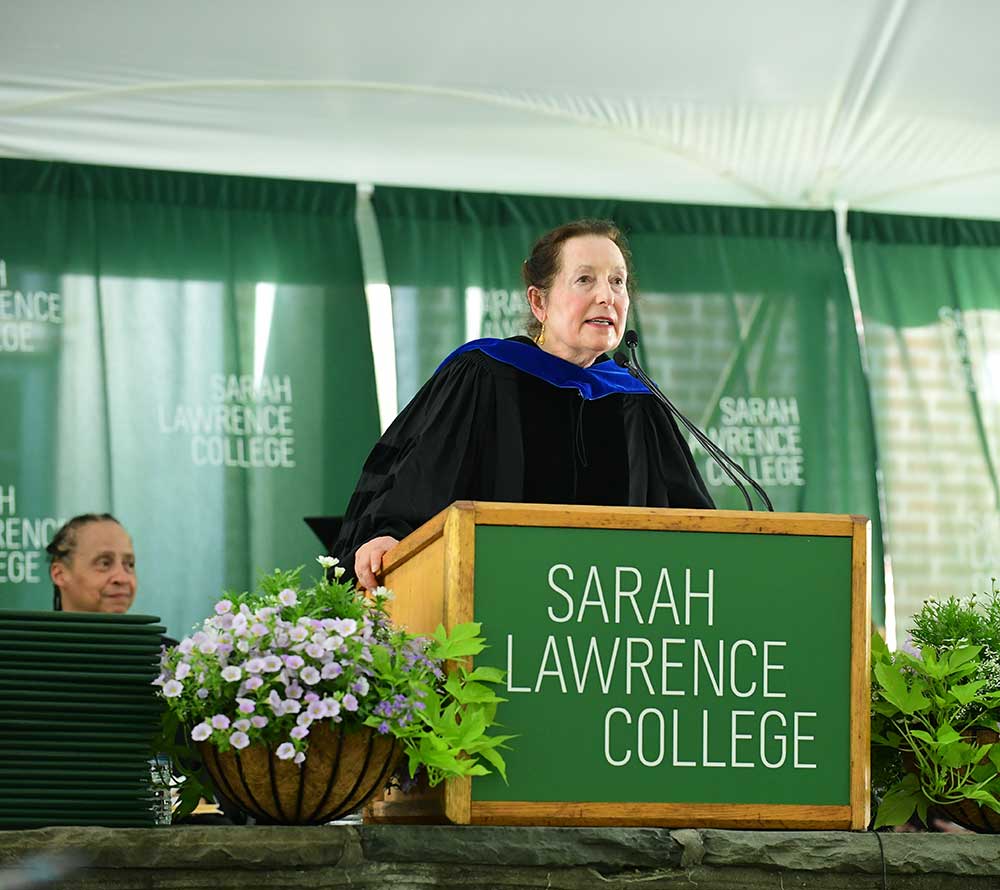 It is my great honor this afternoon to introduce our speaker, Jamal Joseph. Mr. Joseph is a professor at the Columbia University School of the Arts film program. That is his current profession. As I put together this introduction, however, I learned that he has other identities.
It is my great honor this afternoon to introduce our speaker, Jamal Joseph. Mr. Joseph is a professor at the Columbia University School of the Arts film program. That is his current profession. As I put together this introduction, however, I learned that he has other identities.
Among them: Orphan, activist, subversive, urban guerrilla, the FBI’s most wanted fugitive, Black Panther, drug addict, drug counselor, convict, writer, poet, filmmaker, youth advocate, and Oscar nominee.
He is also the founder and artistic director of New Heritage Theater and IMPACT Repertory Youth Theatre of Harlem, and the executive director of New Heritage Films, a not-for-profit organization that provides training and opportunities for minority filmmakers. And he is a husband and father.
All of these identities I imagine have shaped the person who will speak to us today.
In 1968, Jamal was an honor student headed for college when he joined the Harlem chapter of the Black Panther Party. He was 15 years old, but as he has said, he probably looked more like 12 or 13. He went to Rikers Island charged with conspiracy as part of the New York Panther 21. He was released, became one of the leaders of the Panthers revolutionary underground, and eventually was arrested again and sentenced to 12 years in Leavenworth, of which he served 5 ½ years.
While in Leavenworth, he wrote five plays and two volumes of poetry and earned two college degrees—his BA summa cum laude—from the University of Kansas.
At Leavenworth, he founded a theater company. He has described prison in the 1970s as having deep racial divisions among the prisoners. The plays he wrote and produced at Leavenworth helped break down those divisions when he included blacks, whites, and Latinos as cast members.
After his release from prison, his first teaching position was at Touro College in East Harlem. There he created the first historic graduation ceremonies at the Apollo Theatre, with a graduation address by Ossie Davis. The commencement ceremony began with an astonishing Graduation Procession down the middle of 125th Street.
Joseph went on to receive a fellowship from the Sundance Film Institute, became a poet, continue writing plays, and earned an Oscar nomination for his song “Raise It Up” for the film August Rush.
In 2012, he published a memoir of his days as the youngest Panther called, Panther Baby: A Life of Rebellion and Reinvention. Earlier, in 2006, he had written a biography of the rap/hip-hop artist, Tupac Shakur, called Tupac Shakur Legacy. The book is interactive with removable reproductions of Tupac’s handwritten lyrics, notebook pages, personal memorabilia, and a CD featuring rare interviews—a theater production in a book.
Jamal Joseph’s work has appeared on HBO, Fox, New Line Cinema, Warner Brothers, and A&E. He wrote and directed Drive By: A Love Story, Da Zone, and the docudrama Hughes’ Dream Harlem. His film Chapter & Verse, a story about prison and second chances, was released in 2017 to critical acclaim. He is also the author of several screenplays, including Ali: An American Hero, New York Undercover, Knights of the South Bronx, and The Many Trials of Tammy B.
Cornel West, the historian, has called Jamal Joseph a long-distance freedom fighter who never lost his soul and integrity despite the ugly underside of America.
Please join me in welcoming Jamal Joseph.
Jamal Joseph
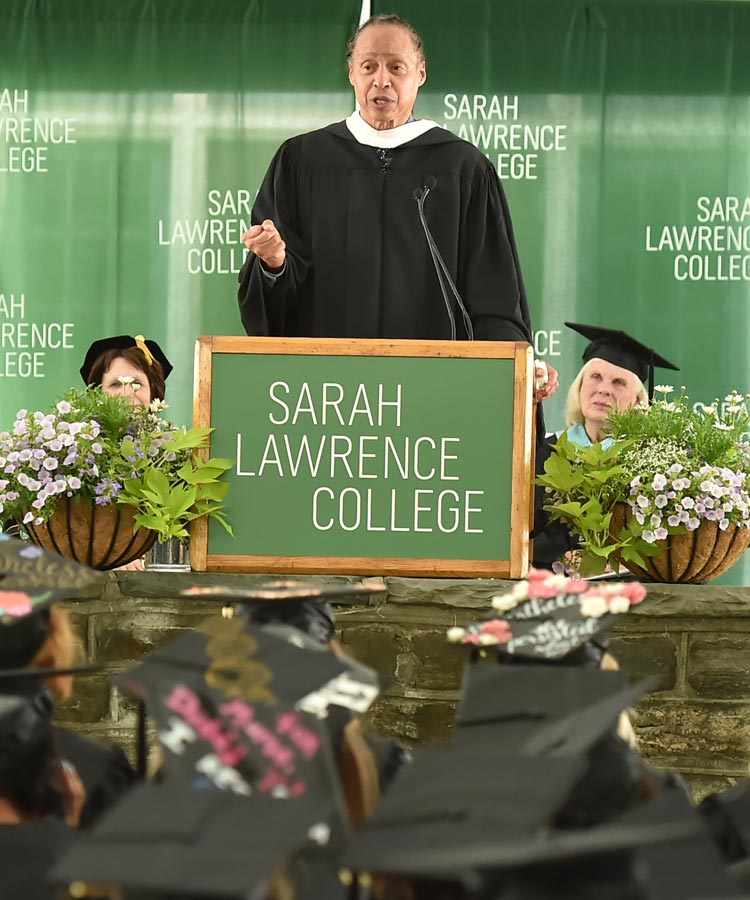 Y’all look really good, graduates. Congratulations. Thank you, Dean Babbitts, President Lawrence, the graduation speakers. It is an honor to be here.
Y’all look really good, graduates. Congratulations. Thank you, Dean Babbitts, President Lawrence, the graduation speakers. It is an honor to be here.
A few years ago, two elderly semi-homeless men were standing in front of the Waldorf Astoria Hotel in Manhattan during a papal visit. The pope came out of the hotel surrounded by security, waved to the adoring crowd, back to the pope mobile, and drove off. One of the men, named Sam, turned to his friend, Bo, and said, “Yo, Bo, man, who was that white dude with that crazy hat on?” Bo’s father answered and said, “The was the pope, fool. You ignorant. You don't know anything. You’re just an ignorant fool.” And Sam said, “I’m not ignorant.” He says, “You are, too.” He said, I’ll make you a bet. He said, “I bet you that I could ask myself a question and can answer it, and you can ask yourself a question and can’t answer it. I’ll bet you a bottle of wine.”
Sam thought about that. I can’t answer my own question? He said it’s a bet. Bo said, “Okay, I’ll go first. Question: How can a rabbit dig a hole and not leave any dirt around the side? Answer: He starts at the bottom.” Bo said, “How can a rabbit dig a hole and not leave any dirt around the side? How does he get to the bottom?” He said, “That’s your question, fool.”
The seed of critical thinking is the question. What is life? What is love? What is joy? What is sadness? What is pain? Who am I? Who are we? Whether this seed called a question blossoms into art, science, education, medicine, technology, or stagnates and withers into ignorance, accepted in oppression, depends on whether this seed is planted in a garden of humanity, or a desert of control and oppression.
We find these truths to be self-evident that all men, and women, are created equal. Inspiring words, written by men who were gathered in the face of British domination. Revolutionary words—but a contradiction for men who owned slaves, and viewed the education of said slaves as bad judgment, in many cases, a crime that received the slave who aspired to knowledge starved, beaten or otherwise tortured. And by the way, the white person or freed negro who dared to teach them, given a summons, ridiculed, beaten, or imprisoned.
And in an economic system that wealth was based on the free and forced labor of an enslaved class, it makes perfect sense that slaves should have been docile and ignorant. Both slave and slave owner needed to believe that the slaves were less than human. Smarter than farm animals, but property nonetheless, to be cared for, guided, disciplined by the superior ones.
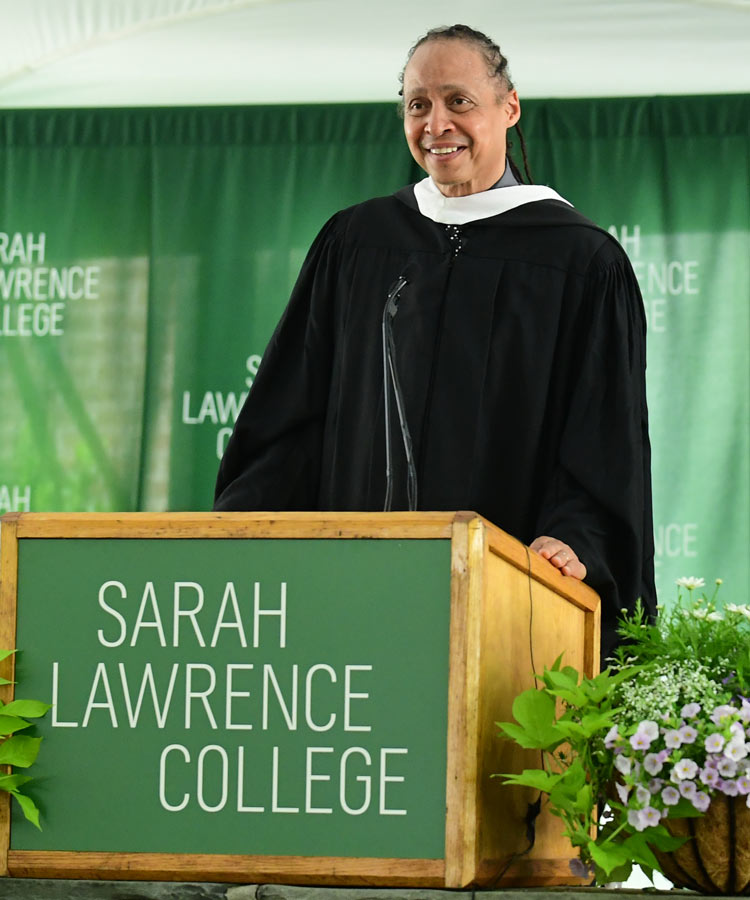 But if I, a slave, could read, do mathematics like the slave master, gaze at the stars and see celestial patterns, and dream of freedom, then it’s just a matter of time before I would begin to ask the question: Why am I a slave? And begin to think longingly and critically about freedom. And so the oppressed class that is educated in the arts and the sciences, and has the gift of self-awareness, begins to ask this question. Why am I oppressed? If I, a slave, can read and can think and can reason, why am I oppressed? If I, a woman, can read, write, do math, sports, arts, and science, as good and in a lot of cases better than any man, then why am I still fighting for equal opportunity, equal pay, justice?
But if I, a slave, could read, do mathematics like the slave master, gaze at the stars and see celestial patterns, and dream of freedom, then it’s just a matter of time before I would begin to ask the question: Why am I a slave? And begin to think longingly and critically about freedom. And so the oppressed class that is educated in the arts and the sciences, and has the gift of self-awareness, begins to ask this question. Why am I oppressed? If I, a slave, can read and can think and can reason, why am I oppressed? If I, a woman, can read, write, do math, sports, arts, and science, as good and in a lot of cases better than any man, then why am I still fighting for equal opportunity, equal pay, justice?
If I, as an LGBT queer person, or an immigrant, or a DREAMer, or physically challenged, or formally incarcerated, can reason, can conceive, then I must have the opportunity for this inalienable right to learn and to achieve.
In his book, Black Skins, White Masks, black French psychiatrist, Frantz Fanon, writes that black people knew they were black because white people told them that they were black. Not just in a cosmetic sense but through words, actions, and deeds that makes them feel marginalized, demonized, and oppressed by a dominant culture. Standards of beauty, ugliness, purity, sin, good, evil, smart, dumb, law-abiding, criminal, become measured in black and white. Be careful around those people. Be extra careful in those neighborhoods. Safer to be among your own kind. But, again, question. This time, from a child simply wanting to play in the park with other children. I thought human was my kind.
Now, radical transformation happens when we begin to tell ourselves, write our own stories, create our own narratives about who we are, and connect that self-affirmation with our brothers and sisters, everywhere.
I was 15-years old when Dr. King was assassinated—an honor student, a church boy, a member of the NAACP Youth Council. I was an orphan kid being solely raised by his grandmother. A man-child who played baseball, and hung out on the streets with older boys in his quest for manhood. I was praised by teachers, and at the same time called nigger by fellow students whose parents were workers and the working poor from the same Bronx neighborhood that we lived in—the black kids and the white kids. I was hugged by seniors in my neighborhood for helping them with their grocery bags, and smacked around by cops for being on the wrong block.
Like so many black kids growing up at that time, I grew up with a dual reality and a dual consciousness. And like so many young black people I was outraged by Dr. King’s death. I got on the subway to the Bronx—or out to Brooklyn, to join the radical Black Panthers. I had seen the Panthers on television marching with their berets, patrolling the streets of Oakland, California, with shotguns and leather coats. We didn’t know quite what we wanted to get into but we know that we wanted to be black militants. In fact, after Dr. King was assassinated, I came to school the next day and told all of my friends that I sat with that I, Eddie Joseph—didn’t have the name Jamal at that time—was going to be a black militant.
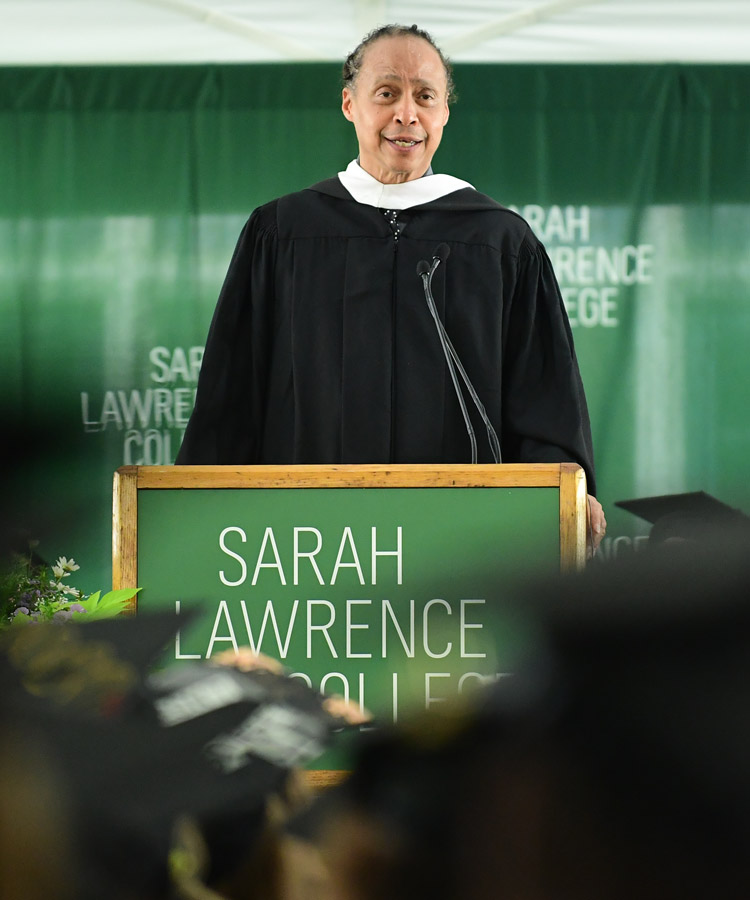 One of my best friends was a white kid, a Jewish kid, named Paul. And he said, “Eddie, I don't know if you’re just saying you’re going to be a militant like it’s a career choice, like a doctor or a lawyer.” I was like, “No, Paul, you watch. I’m going to do this.” And so to prove to Paul as much to myself I had to seek out the roughest and toughest, the Black Panthers. As I’m riding, my two older friends, who also didn’t know much, but I thought knew more than me, leaned over and told me what it was going to be to be a Panther. “You know it’s like the Mafia, man. Once you get in, there’s no getting out.” I was like, “No getting out?” But I couldn't be a chump in front of my boys. I was like, “I don't care.”
One of my best friends was a white kid, a Jewish kid, named Paul. And he said, “Eddie, I don't know if you’re just saying you’re going to be a militant like it’s a career choice, like a doctor or a lawyer.” I was like, “No, Paul, you watch. I’m going to do this.” And so to prove to Paul as much to myself I had to seek out the roughest and toughest, the Black Panthers. As I’m riding, my two older friends, who also didn’t know much, but I thought knew more than me, leaned over and told me what it was going to be to be a Panther. “You know it’s like the Mafia, man. Once you get in, there’s no getting out.” I was like, “No getting out?” But I couldn't be a chump in front of my boys. I was like, “I don't care.”
My other friend said you’re going to have to prove yourself. You know you have to kill a white dude to be a Panther. I’m like, “Kill somebody? I’m in the choir at church.” I don't care. I can’t be a punk in front of my boys.
My other friend said no, get it right. You ain’t got to kill a white dude. Oh, thank you. I don’t have to kill nobody. He said you got to kill a white cop and you got to bring back his badge and his gun. Well, I wanted to run off the train and I think my friends wanted me to run so they could follow me. But we showed up at the Panther office. And when I sat in the back row, looking at all the cool Panthers, the brothers and sisters with their leather coats and their dashikis and the African geles; the older brothers and sisters.
Let me put this in perspective. I was 15 years old but they were 18, 19, 21, 22 years old. The person behind the desk was explaining the Panther 10-Point Program. Go online and read it. It talks about housing, shelter, control of the police. It talks about medicine. It talks about community control. Nothing in there about killing anybody; about bringing any cop’s badge and gun. But I’m not listening. I have my inner monologue.
As he’s reading Point No. 5, which is about education, I jump up and I say, “Choose me, brother. I’d kill a white dude, right now.” The whole room got quiet. He called me up front. Tipped down his sunglasses and said, “Come here, young blood. And as I sat next to the desk, he opened the bottom drawer. As he reached in, my heart is pounding in my skinny little chest and I said, he’s going to give me a big damn gun. And he hands me the secret weapon of liberation. Brothers and sisters, he gave me a stack of books:
The Autobiography of Malcolm X, Wretched of the Earth, by Frantz Fanon, Soul on Ice, by Eldridge Cleaver. And I’m thinking because one what my friends said, “This must be a test.” And so I said, “Excuse me, brother, I thought you were going to arm me.” And he said, “Excuse me, young brother. I just did.”
As I’m walking to my seat, he stops me. It wasn’t over yet. He said, “Young brother, let me ask you something since you came in here so mad at white folks. If all of the cops in the community that are brutalizing people, beating them up locking them up, shooting them down, were black, and the people being brutalized were white, if all of the people that owned the stores in the community that are ripping people off with high prices, spoiled vegetables, rotten meat, were black, and the people being exploited and ripped off were white, if all of the fascist politicians were black and the people being exploited and oppressed, would that make things correct?” And I thought this time with my mind, instead of my now-bruised man-child ego, and I said, “No, sir. It seems like it would still be wrong.” And for the first time he smiled and he said, “That’s right, young brother. This is a class struggle for human rights. Not just a race struggle for civil rights. Study those books so you know what true revolution is all about.”
On the wall was a poster, a quote from Che Guevara from a speech that he gave in the United Nations in 1959. And it said at the risk of sounding ridiculous, let me say that revolutionaries are guided by great feelings of love. Lessons I learned as a Panther that first day. You need a rainbow coalition. You need to understand that for everyone to be liberated, we all must be free. Yes, the Panthers worked and organized in the black community, started free breakfast programs, health clinics. The breakfast program that became a model for food programs across the country, today, done by high school students, college students who were Panthers, people coming out of prison, former street people, people who had been welfare moms that knew that kids going to school on hungry stomach, maybe that’s the problem. Someone saying three apples, plus two apples, equal five apples, it’s hard to digest in kindergarten and first grade if your stomach is growling.
So you organize people around their needs. And you find those connected needs with people in other communities, and you don't let them define you by saying that you’re different because you’re black, because you’re white, because you’re this. But that we as a human feeling will struggle together and the Panthers said it’s not just about black power, it’s all power to the people. It is white power, it is brown power, it is red power, it is LGBT power, it is immigrant power—it is power to all people.
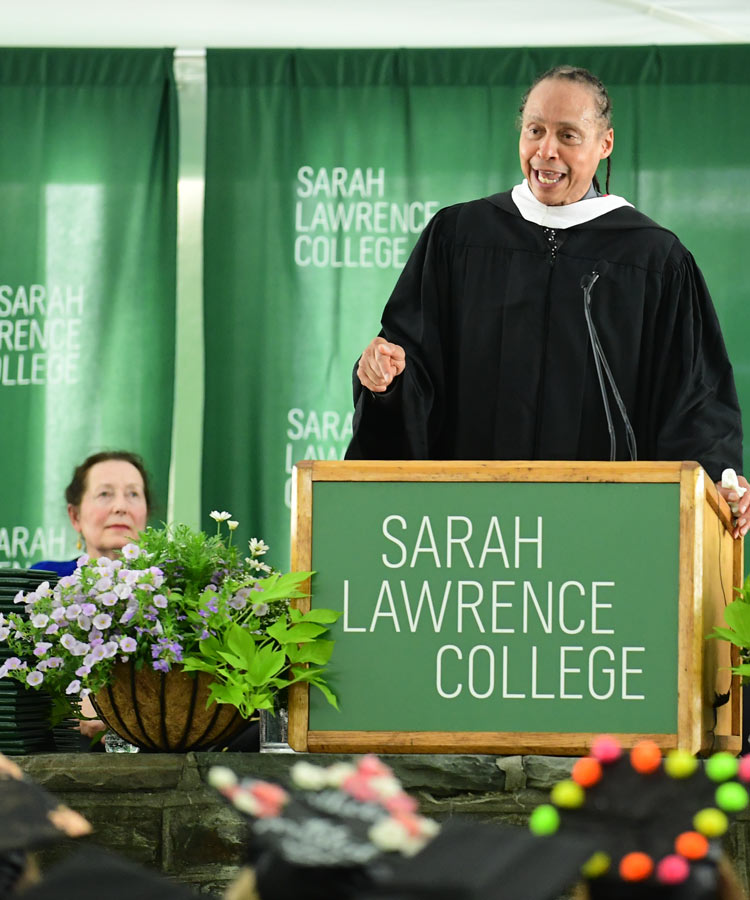 Second great life lessons came in prison. When I got Leavenworth and was faced with starting to do my 12-year sentence, an old convict named Mr. Cody came to me and he said, “Young blood, you can serve this here time, or you can let this time serve you.” And I feasted on that wisdom. And I signed up for every program. And the University of Kansas had a great program. They would come in four nights a week
Second great life lessons came in prison. When I got Leavenworth and was faced with starting to do my 12-year sentence, an old convict named Mr. Cody came to me and he said, “Young blood, you can serve this here time, or you can let this time serve you.” And I feasted on that wisdom. And I signed up for every program. And the University of Kansas had a great program. They would come in four nights a week
The most gangsta person I saw in Leavenworth, and people were doing 50 years, life, double life, just like you saw, I had a little magazine article that I would show about some guys gathered in the yard and they were like, you know, with the goatees and tats all over their body, and the skull caps looking real rough and tough. And I said, “Yeah, this is a photo taken at Leavenworth.” And they said, “Man, those are some tough-looking Latinos.” I went, “No, these are the white boys.” This is how tough Leavenworth was.
But the most gangsta prisoner in Leavenworth was a 70-year-old white woman who was about five foot three, who was a professor from KU, named Dr. Johnson. She was an English professor. She stood in front of the room of these men that I’m describing and gave us no slack. Mr. Joseph, I know you could do better, and would red mark the paper. Mr. Robinson, I know you could do better.
One day, she came in what that the Bible. She had red-lined it. She found grammatical errors. We’re like, no. If she’s going to red tape God, I can’t mess with Professor Johnson. In that moment, with no guards, with no bars, we understood her love, her dedication, her sacrifice and that she cared to ask the question, that these men want to learn. That if they want to study history and math and science and sociology, then what makes them prisoners? You’re free as long as you’re here, she told us. And you’ll be free beyond that if you remember the lessons of a mind, and that there’s no stronger weapon than an armed mind and love.
The third thing I learned is when I came home from prison. And like many people I had plans. I had discovered theater in prison, and created a theater company. And originally it was a theater company for just the black prisoners. We were doing a Black History Month play, and some leaders from the Mexican mafia came to rehearsal. Now La eMe never leaves their section of the yard unless they got beef. And if La eMe got beef, it’s usually to kill somebody. So when two leaders, Tito and Raphael came to our rehearsal, everybody who was there was like, “Who do they have beef with?”
I’m rehearsing with two of the guys, teaching with improve, and after about five minutes into the rehearsal, one of the guys pointed at me and was like, “Yo homes, let me speak to you a minute.” And I came over, I went, “Damn, it’s me. I just got here.”
Tito pulled me to the side, and he said, “Homes, I heard rumors about what you were doing so I had to come here to check it out for myself. And I’m watching you and your man over there and I’m telling you something, and you need to listen to me good. That dude you’re rehearsing with right there, that guy, he’s not feeling his character.” So Tito joined the company.
And then one of the real tough guys who hung out with bikers and Arian Brotherhood came, and his name was Rebel. He went back to his section of the yard and was surrounded by his guys and it was like, “Reb, you were with the blacks and the Latinos?” And he said, “Yep.” And Reb was like six three, muscular, black belt, could knock you out with either hand and either foot, and an avowed racist. And all the guys came around him and they said, “Reb, you was with the blacks and the Mexicans?” He said, “Yep.” They said “What are they doing, Reb?” He said, “A play.” They said, “Reb, well, what did you do about it?” He said, “Well, they gave me a part.”
I learned that you have to let time serve you. And I also learned the power of education and art to break down all boundaries.
Men who had grown up hating one another, men who in that prison were fighting one another were now together in that classroom and in our rehearsal room making art, and we changed the dynamic. We did it for ourselves. We made the atmosphere adjust. We made that prison adjust to the question that we had asked ourselves and that we were answering.
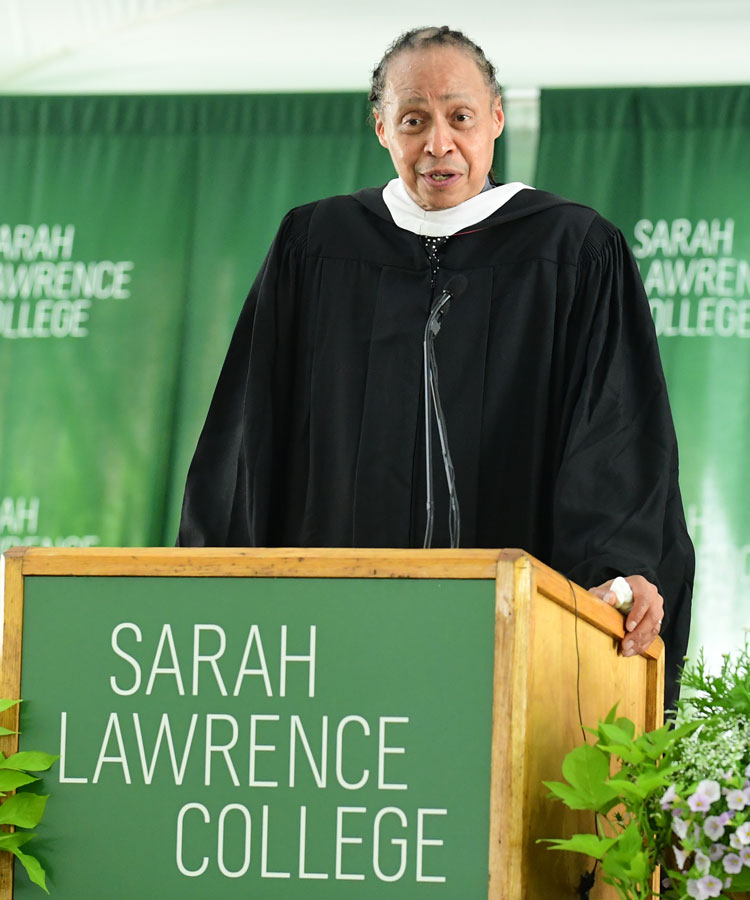 And then the third question was a question of time, after I came out of prison. One of my first jobs was working in a place called Changing Scenes, where I was working on young men who were on probation and mandated to take as part of this program Job Skills Readiness, and I was teaching a theater program. And I was ready. After all, I had done this when I was in prison. We would do some improve, we would write a script, we’d do a play, they’d invite their family and friends.
And then the third question was a question of time, after I came out of prison. One of my first jobs was working in a place called Changing Scenes, where I was working on young men who were on probation and mandated to take as part of this program Job Skills Readiness, and I was teaching a theater program. And I was ready. After all, I had done this when I was in prison. We would do some improve, we would write a script, we’d do a play, they’d invite their family and friends.
A few minutes into it, it became clear that I needed to throw my curriculum out the window. These young brothers were talking about who they had beef with, who they were going to beat up, who they were going to kill. And I realized my job as a teaching artist, and a formerly incarcerated person, was to get them back alive in a week. So I would do improve. We’d do spoken word. I’d take the temperature of the room and try to give them some advice. And it’s one of the jobs that I think I didn’t do so good with them. I didn’t transform them the way I wanted.
I harken back to how long transformation takes sometimes. We think about the end of slavery that it started with the Civil War. But keep in mind, there was an abolitionist movement that had existed for 30 years. That had great people like William Lloyd Garrison, a white publisher, Harriet Beecher Stowe, the bestselling author at the time, Frederick Douglass, coming together. Whites, blacks, poor, rich, free, enslaved, to create a movement that grew in relenting pressure until this government had to deal with one of the greatest sins in human history. It took a movement.
The Women Suffrage Movement first started declaring itself in 1848. Susan B. Anthony and other leaders would not live to see the success of their movement. They wouldn't live. In 1920, when it first got enough congressional and senate support for it to be. So movements take time. But a lot us think let’s think let’s deal with the transformation. We want it to happen instantly.
I fast forward to about five years ago. I’m walking down a street in Harlem with my oldest son. And a young man about 30 years old said, “Mr. Joseph,” I’m so glad to see you. You don't remember me but I was one of those knucklehead kids in that program. I was like, no, man, you weren’t a knucklehead. He was like, no, trust me, I was a knucklehead.
He said, but you came each week and you always gave us something positive to think about, and you always said all of this stuff and it didn’t make any sense to me at the time. He said, “But about two years later, it came in. And I’m so glad that I’m seeing you, now. Because I’m a husband, now; I’m a father, now; I’m a social worker, now. Thank you.”
Think of time as something that helps you regulate in terms of appointments and in terms of deadlines and goals. But in terms of your life plan, in terms of what you’re going to do to transform the world, think of the timeline of life and the way that Native American people do and certain people in Africa. Be in tune with your neighbor, with your environment. Know that when you plant the seeds of something, that sometimes you’ll see it blossom and sometimes you’re planting seeds that you’ll see much later on, or maybe not in your lifetime, but you did that regardless.
As you go forward, congratulations on your accomplishments. Remember that your education as teachers, and as geneticists, and as lawyers, and as historians, and as dancers, and as artists, and as therapists and all of the things, and your desire to change people’s lives, your commitment to do this, that is your super power. You are the real transformers.
And like all super heroes, before you leave the X-Men Institute or the Bat Cave, along with your training there are some things that you want to remember as you’re going forth to transform the world and conquer evil. What is your question? And the guiding principles that come from the answer to that question will be what sustains you.
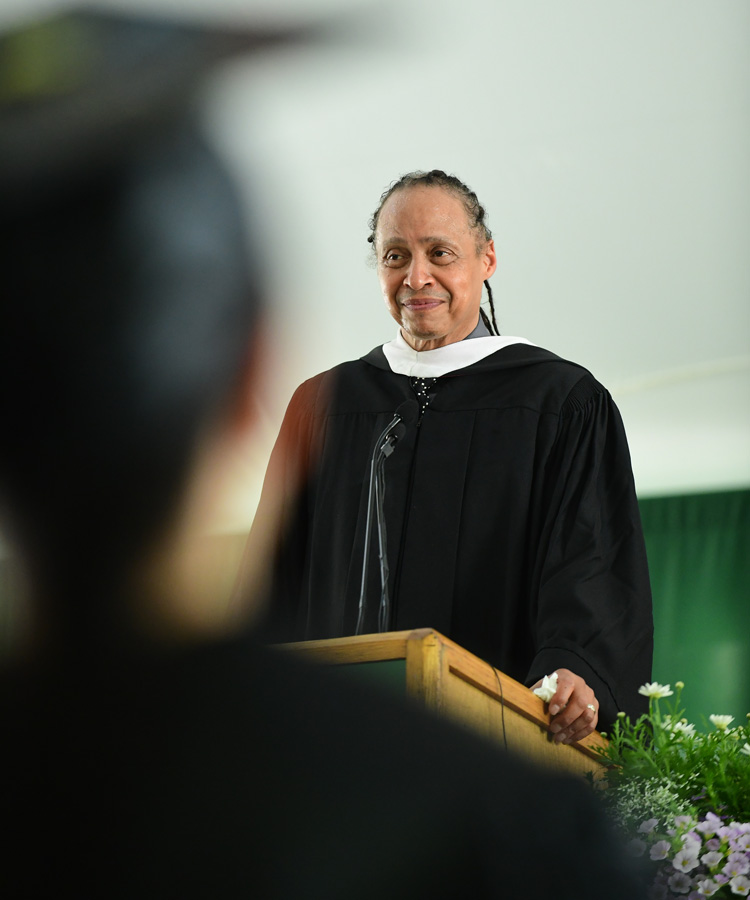 Friends may let you down at times, colleagues may disappoint, lovers may break your heart, but your principles will help you stand strong.
Friends may let you down at times, colleagues may disappoint, lovers may break your heart, but your principles will help you stand strong.
What is your greater love? The people you haven't met but that you know that are your brothers and sisters. The seeds that you plant for the garden that you’ll never see. What is that greater love beyond yourself? And who is your rainbow posse? Not just your digital friends or your Facebook friends, but like, as we look out, today, that will help you laugh when all seems lost, that will help you cry when you have collectively achieved that crazy impossible thing that no one believed could happen but you. Hang on to your posse. Hang on to that love.
A little boy went to the state fair with his family. And there were pony rides, and a Ferris wheel and cotton candy, but the thing that really caught this kid’s attention was an old man who was giving away balloons. And there were so many kids and so many balloons next to his helium tank that one little balloon got away from the old man, a red balloon, and it floated up and up and up. And a few minutes later, a green balloon got away and floated up and up and up. And the little boy couldn't take it anymore and he broke through the crowd and he pulled on the old man’s leg and he said, “Mr. Balloon Man, did you see that? Did you see that? The green balloon went just as high as the red balloon.” And the old man look at that little boy and he smiled and he said, “Son, always remember this. It’s not the color on the outside but the stuff on the inside that will make you rise.” Rise today at graduation. Rise.